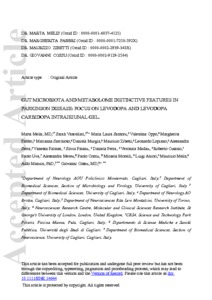Melis, M;
Vascellari, S;
Santoru, ML;
Oppo, V;
Fabbri, M;
Sarchioto, M;
Murgia, D;
Zibetti, M;
Lopiano, L;
Serra, A;
et al.
Melis, M; Vascellari, S; Santoru, ML; Oppo, V; Fabbri, M; Sarchioto, M; Murgia, D; Zibetti, M; Lopiano, L; Serra, A; Palmas, V; Pisanu, S; Perra, D; Madau, V; Cusano, R; Uva, P; Mereu, A; Contu, P; Morelli, M; Atzori, L; Melis, M; Manzin, A; Cossu, G
(2021)
Gut microbiota and metabolome distinctive features in parkinson disease: Focus on levodopa and levodopa carbidopa intrajejunal gel.
Eur J Neurol, 28 (4).
pp. 1198-1209.
ISSN 1468-1331
https://doi.org/10.1111/ene.14644
SGUL Authors: Sarchioto, Marianna
![[img]](https://openaccess.sgul.ac.uk/112661/1.hassmallThumbnailVersion/ene.14644.pdf)  Preview |
|
PDF
Accepted Version
Available under License ["licenses_description_publisher" not defined].
Download (2MB)
| Preview
|
Abstract
BACKGROUND: Recent data suggest that imbalances in the composition of the gut microbiome (GM) could exacerbate the progression of Parkinson's Disease (PD). The effect of Levodopa (LD) has been poorly assessed and those of LD-carbidopa intestinal gel (LCIG) have not been evaluated so far. The aim of this study was to identify the effect of LD and, in particular, LCIG on GM and metabolome. METHODS: Faecal DNA samples from 107 patients with clinical diagnosis of PD were analyzed by next-generation-sequencing of V3 and V4 regions of the 16S rRNA gene. PD patients were classified in different groups: patients on LCIG (LCIG-Group) (n= 38) and on LD (LD-Group) (n= 46). We also included a group of patients (n = 23) without antiparkinsonian medicaments (Naïve-Group). Faecal metabolic extracts were evaluated by Gas Chromatography Mass Spectrometry (GC-MS). RESULTS: The multivariate analysis showed a significant higher abundance in the LCIG-Group of Enterobacteriaceae, Escherichia and Serratia compared to LD-Group. Compared to Naïve-Group, the univariate analysis showed a reduction of Blautia, Lachnospirae in LD-Group. Moreover, an increase of Proteobacteria, Enterobacteriaceae and a reduction of Firmicutes, Lachnospiraceae and Blautia was found in the LCIG- Group. No significant difference was found in the multivariate analysis of these comparisons. The LD-Group and LCIG-Group were associated to a metabolic profile linked to gut inflammation. CONCLUSION: Our results suggest that LD and mostly LCIG might significantly influence the microbiota composition and host/bacteria metabolism acting as stressors in precipitating a specific inflammatory intestinal microenviroment, potentially related to the PD state and progression.
| Item Type: |
Article
|
| Additional Information: |
This is the peer reviewed version of the following article: Melis, M., Vascellari, S., Santoru, M.L., Oppo, V., Fabbri, M., Sarchioto, M., Murgia, D., Zibetti, M., Lopiano, L., Serra, A., Palmas, V., Pisanu, S., Perra, D., Madau, V., Cusano, R., Uva, P., Mereu, A., Contu, P., Morelli, M., Atzori, L., Melis, M., Manzin, A. and Cossu, G. (2021), Gut microbiota and metabolome distinctive features in Parkinson disease: Focus on levodopa and levodopa‐carbidopa intrajejunal gel. Eur J Neurol, 28: 1198-1209, which has been published in final form at https://doi.org/10.1111/ene.14644. This article may be used for non-commercial purposes in accordance with Wiley Terms and Conditions for Use of Self-Archived Versions. |
| Keywords: |
Duodopa, LCIG, Levodopa, Parkinson, microbiota, 1103 Clinical Sciences, 1109 Neurosciences, Neurology & Neurosurgery |
| SGUL Research Institute / Research Centre: |
Academic Structure > Molecular and Clinical Sciences Research Institute (MCS) |
| Journal or Publication Title: |
Eur J Neurol |
| ISSN: |
1468-1331 |
| Language: |
eng |
| Dates: |
| Date | Event |
|---|
| 8 March 2021 | Published | | 16 December 2020 | Published Online | | 5 November 2020 | Accepted |
|
| Publisher License: |
Publisher's own licence |
| Projects: |
| Project ID | Funder | Funder ID |
|---|
| 20612/2018 | Fondazione di Sardegna | UNSPECIFIED |
|
| PubMed ID: |
33185912 |
 |
Go to PubMed abstract |
| URI: |
https://openaccess.sgul.ac.uk/id/eprint/112661 |
| Publisher's version: |
https://doi.org/10.1111/ene.14644 |
Statistics
Item downloaded times since 30 Nov 2020.
Actions (login required)
 |
Edit Item |



